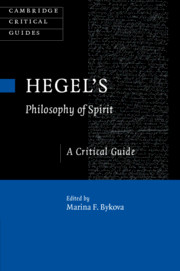Book contents
- Hegel’s Philosophy of Spirit
- Cambridge Critical Guides
- Hegel’s Philosophy of Spirit
- Copyright page
- Contents
- Contributors
- Acknowledgments
- Abbreviations
- Introduction
- Part I Philosophy of Spirit and Hegel’s Philosophical System
- Part II Philosophy of Subjective Spirit
- Part III Philosophy of Objective Spirit
- Part IV Philosophy of Absolute Spirit
- Chapter 10 The “Absoluteness” of Hegel’s Absolute Spirit
- Chapter 11 Art as a Mode of Absolute Spirit:
- Chapter 12 Art, Logic, and the Human Presence of Spirit in Hegel’s Philosophy of Absolute Spirit
- Bibliography
- Index
- Cambridge Critical Guides
Chapter 11 - Art as a Mode of Absolute Spirit:
The Development and Significance of Hegel’s Encyclopaedia Account of the Philosophy of Art
from Part IV - Philosophy of Absolute Spirit
Published online by Cambridge University Press: 24 June 2019
- Hegel’s Philosophy of Spirit
- Cambridge Critical Guides
- Hegel’s Philosophy of Spirit
- Copyright page
- Contents
- Contributors
- Acknowledgments
- Abbreviations
- Introduction
- Part I Philosophy of Spirit and Hegel’s Philosophical System
- Part II Philosophy of Subjective Spirit
- Part III Philosophy of Objective Spirit
- Part IV Philosophy of Absolute Spirit
- Chapter 10 The “Absoluteness” of Hegel’s Absolute Spirit
- Chapter 11 Art as a Mode of Absolute Spirit:
- Chapter 12 Art, Logic, and the Human Presence of Spirit in Hegel’s Philosophy of Absolute Spirit
- Bibliography
- Index
- Cambridge Critical Guides
Summary
This bare-bones formulation may raise as many questions as it settles, and it is often glossed by reference to the only somewhat more expanded account that Hegel gave of art’s role in the concluding sections on Absolute Spirit as that came to be sketched in the Encyclopaedia of Philosophical Sciences.
Hegel’s treatment of art in the Encyclopaedia’s section on Absolute Spirit in its final (1827/30) form is only eight paragraphs, but it does contain arguably the most systematic and mature account Hegel gave of art, in particular, the relation between the philosophy of art and the philosophy of spirit.2 While these paragraphs are often appealed to as providing the philosophical justification of Hegel’s more wide-ranging treatment of artistic and aesthetic topics in the Berlin Lectures on the Philosophy of Art, their genesis has not received correspondingly much treatment – an unfortunate fact, since Hegel actually revised a number of elements of this eight-paragraph account as his view of the systematic place of art changed in significant ways over the decades following the publication of the final part of the Science of Logic. In particular, one can see over the three published versions of the Encyclopaedia (the 1817 Heidelberg version and the 1827 and 1830 Berlin versions) Hegel’s attempts to resolve some of the more difficult aporiai raised by the positioning of art as a mode of Absolute Spirit.
- Type
- Chapter
- Information
- Hegel's Philosophy of SpiritA Critical Guide, pp. 225 - 242Publisher: Cambridge University PressPrint publication year: 2019
- 1
- Cited by

